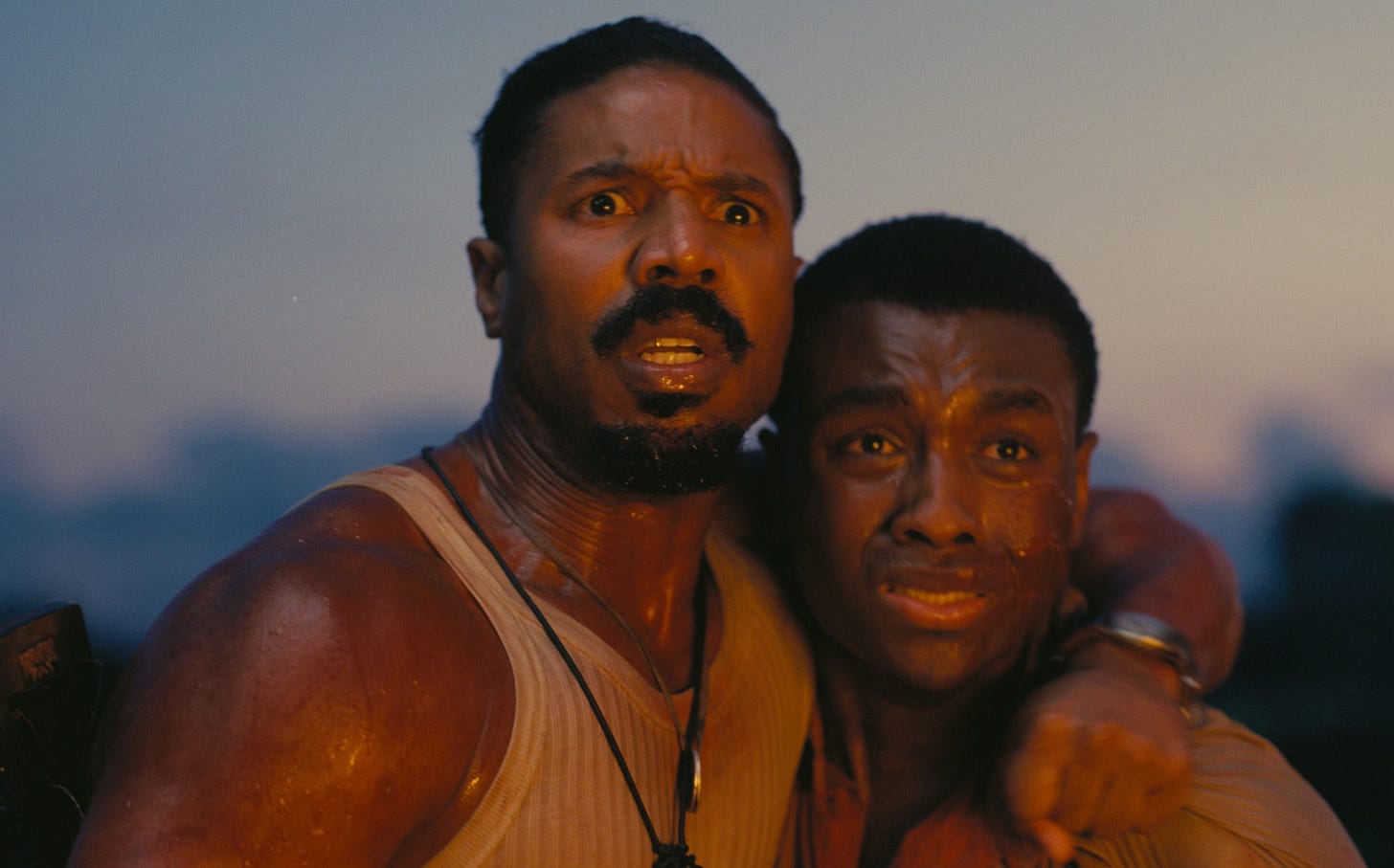Sinners
The blues, extra bloody.
There’s no other music quite like the blues: a lament that saunters up and down a guitar neck, a genre that invites listeners both to dance and to sit in their sadness, whether personal or communal. Black American theologians from James Cone to Karen Baker-Fletcher have referred to the genre as a unique expression of Black spirituality. In her book Dancing with God, Baker-Fletcher ties the blues directly to the Korean concept of han, or the feeling of having been sinned against. Writer/director Ryan Coogler’s Sinners is built around the blues, music that one character calls “so true, it can pierce the veil between life and death.” The music is beautiful, but it attracts monsters too, like moths to a flame: Sinners is a vampire movie. Despite its title, the film is less interested in the concept of sin and evil than it is in expressing the feeling of having been sinned against. It’s a movie that, on a theological level, gets the blues.
It’s October 1932, the end of Prohibition and the seasonal end of the cotton harvest in the Mississippi Delta. Twin brothers Smoke and Stack—both played by Michael B. Jordan with a fire that lives up to the characters’ names—have returned home after years away in Chicago. They’ve written off the city, preferring to “deal with the devil we know” instead of navigating a subtler form of racism up north. They have a scheme to convert an old mill in town into a juke joint, a place for the sharecroppers in town to forget their hard days and dance away their worries in a layer of sweat and alcohol. Their dreams of profit prove difficult to realize; it’s hard to turn a profit when your customers can only pay in plantation scrip. And though the two carry themselves with confidence, they’re returning home to people they’ve hurt: ex-lovers, family, a vulnerable position in a town that’s built explicitly to shut them out—and ravenous monsters wandering around after dark.
Coogler takes his time establishing the time and the place, a storytelling choice that helps lend his characters additional depth as we get to understand their town. It’s a welcome decision, given that the film has a lot on its mind, from music to the complex web of small-town interpersonal relationships, notions of family and disappointment and the daily grind of an existence that is not built with the best interests of most people in town at heart. One great long take follows the grocer’s daughter out of the store where she’s been talking to Smoke and Stack across the street to fetch her mother from the family’s other business: a second grocery store that caters to the town’s white residents, evidence of the racism baked into the town’s infrastructure.
The movie is complex on a technical level, too. It doesn’t shy away from showcasing Michael B. Jordan’s dual role, introducing both characters in the same shot as they lean against a car, passing a cigarette and a lighter back and forth under the blazing sun in a feat of blocking and composite work. Sinners’ central setpiece is an astonishingly complicated dance sequence in the juke joint, meant to communicate the timelessness of the blues specifically and good music in general. Throw vampires into the mix, and the film nearly staggers under its own weight. It does stumble a few times with the use of a few flashbacks to drive a point home. This is an excusable choice, given the movie’s complexity, but one that still feels obvious in the moment whenever it’s employed.
A little less obvious is the movie’s definition of “sin,” which is used as an epithet for breaking the (clearly unjust) law, or else simply for skipping church to play the blues. Less overt, but no less important, is the inequality inherent in the segregationist South. Every character in the film has been sinned against in some way, though each feels the hurt differently. Annie (Wunmi Mosaku), Smoke’s ex, refuses his money after he returns to town, claiming it’s “blood money,” and Smoke replies that “all money comes with blood.” The movie never quite breaks free of its characters’ individual—and conflicting—conceptions of sin.
Nor does it quite manage to draw out the thematic resonances between its human characters, the everyday sin they must deal with, and the vampires who come calling in the dead of night. The vampires themselves are fairly traditional, bloodthirsty rule-followers who must be invited into a building. Sin, on the other hand, needs no invitation, though the sin of the segregationist South certainly made itself known through the use of the rule of law. The bloody metaphor almost coheres. When it does work, though, it’s rousing stuff. For all its heavy themes, Sinners is light on its feet, an enthusiastically violent response to the power of evil, a kind of revenge film about retribution for the sinned-against. Like the blues it’s built around, it saunters through its grief, making art out of its inherent sadness.—Sarah Welch-Larson
★★★☆
Sinners is in theaters now. See it in IMAX if you can.




loved your review!